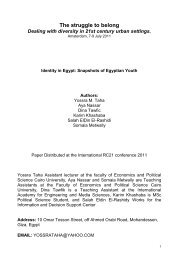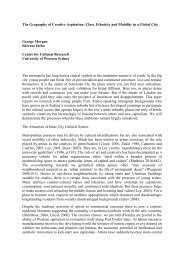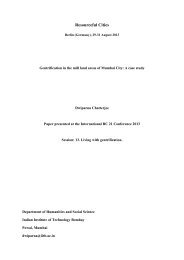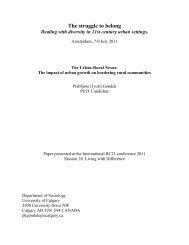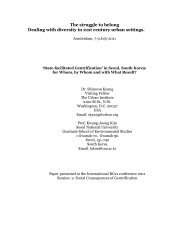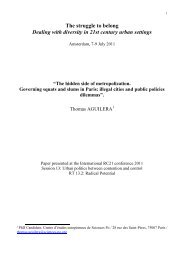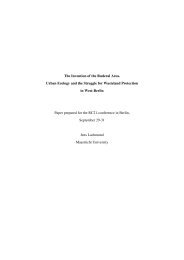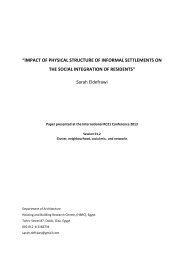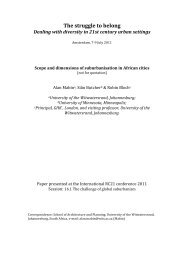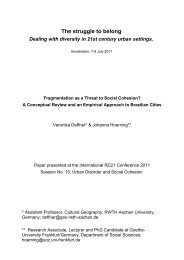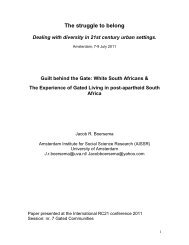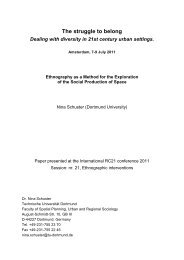Gentrification as a broad process of reurbanization - RC21 ORG ...
Gentrification as a broad process of reurbanization - RC21 ORG ...
Gentrification as a broad process of reurbanization - RC21 ORG ...
You also want an ePaper? Increase the reach of your titles
YUMPU automatically turns print PDFs into web optimized ePapers that Google loves.
Judit Veres CEU Budapest<br />
Deutsche in her book ―Evictions‖ writes that instead <strong>of</strong> celebrating redevelopment <strong>as</strong><br />
a ‗revitalizing‘ and ‗beautifying‘ <strong>process</strong>, it is more apposite to view it <strong>as</strong> the<br />
historical form <strong>of</strong> ‗late-capitalism urbanism‘, which also facilitates new relations <strong>of</strong><br />
domination and oppression, transforming cities for private pr<strong>of</strong>it and state-control.<br />
The mechanism for redevelopment destroys the very conditions <strong>of</strong> survival – housing<br />
and services – for residents no longer required for the city‘s economy. ‗The<br />
emergence <strong>of</strong> a large population <strong>of</strong> homeless residents is redevelopment‘s most<br />
visible symptom.‘ (Deutsche, 1996, p. xiv) Neil Smith‘s argument that gentrification<br />
is becoming a generalized urban strategy <strong>of</strong> development deployed in the global south<br />
and in the global north alike against a larger backdrop <strong>of</strong> uneven economic and<br />
geographical development <strong>as</strong> a structural rather than an incidental feature <strong>of</strong> cities<br />
also compellingly argues that growth is far from a uniform <strong>process</strong>, and it is driven by<br />
a hierarchical differentiation <strong>of</strong> social groups and territories, re-producing inequalities<br />
and marginalization at the same time that it produces privilege and domination.<br />
In the 2010 general elections the extreme right wing party Jobbik managed to gather<br />
enough votes to secure 11 seats in the parliament. With an agenda that is unab<strong>as</strong>hedly<br />
anti-Roma advancing extremely punitive and repressive me<strong>as</strong>ures the party‘s support<br />
h<strong>as</strong> been steadily growing within a larger constellation in which a more and more<br />
repressive state is taking shape.<br />
The deeper concern about what the current political establishment will decide about<br />
Trafó w<strong>as</strong> fed by the rumors some months ago about the closure or merger <strong>of</strong> some<br />
cultural institutions. That time it w<strong>as</strong> heard that there would be a merger betweenironically<br />
- PeCSa/Petőfi Hall, the famous pop-rock concert spot with an open stage<br />
capacity <strong>of</strong> 6000 people, and Trafó, with voices that PeCSa would be eventually<br />
demolished.<br />
Even if the special budgetary freeze decided by the government in the summer 2010<br />
did not affect that time Trafó, this does not preclude the possibility <strong>of</strong> losing<br />
significant financial support in the future or even being transformed into something<br />
totally different. Similarly to repertory theatres Trafó h<strong>as</strong> to house 140 productions<br />
during the 2010-2011 artistic year and try and secure full house productions. Since<br />
Trafó is not a repertory theatre to have the same play run for weeks on end, with the<br />
21




